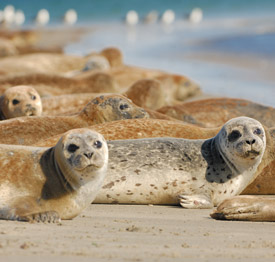Species conservation poised to benefit from DNA advances
A biologist at the University of York is part of an international team which has shown that advanced DNA sequencing technologies can be used to accurately measure the levels of inbreeding in wild animal populations.

Harbour seals (credit: Oliver Krüger)
The research by senior author Dr Kanchon Dasmahapatra, of the Department of Biology at York, and led by Dr Joseph Hoffman, of the Department of Animal Behaviour, Bielefeld University, Germany, may help efforts to conserve rare species.
Laboratory studies show that inbreeding reduces fitness. However, studying the impact of inbreeding in wild populations has previously been challenging because this requires a detailed family tree. Previous DNA studies trying to establish the link between inbreeding and fitness in wild animals had limited success as they used only a small number of genetic markers – around 10.
But the new research, published in PNAS, has used high throughput sequencing, generating more than 10,000 genetic markers, to assess inbreeding in a captive mouse population as well as in wild harbour seals.
Using a zoo population of mice with a known family tree, the researchers first checked the validity of their method for measuring inbreeding. They then carried out autopsies and took DNA samples from harbour seals stranded on Dutch beaches. The study revealed that inbred individuals were more likely to suffer from lung parasite infection.
Dr Hoffman said: "We have shown that in some species inbreeding in the wild may be a bigger problem than previously thought".
Dr Dasmahapatra explained: "This technique can be used to establish if there is an inbreeding problem in wild populations so that possible remedial action can be taken."
The study included scientists from University College London, the British Antarctic Survey, Erasmus University and Utrecht University in The Netherlands, CNRS Montpellier, France, and Chicago Zoological Society, USA.
Further information
- The paper ‘High-throughput sequencing reveals inbreeding depression in a natural population’ is published in PNAS.
- For more information about the Department of Animal Behaviour at Bielefeld University, please visit www.uni-bielefeld.de/biologie/vhf/
- For more information about the Department of Biology at the University of York, please visit www.york.ac.uk/biology/
